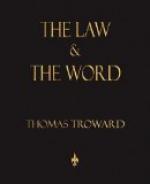Thus we see that however infinitesimal any part may be as compared with the whole, it must also be a complete whole on its own scale, if the greater whole is to be built up. On the same principle, our recognition that our personality is an infinitesimal fraction of an inconceivably greater Life, does not mean that it is at all insignificant in itself, or that our individuality becomes submerged in an indistinguishable mass; on the contrary, our own wholeness is an essential factor towards the building up of the greater whole; so that as long as we keep before us the building up of the Great Whole as the “main motif,” we need never fear the expansion of our own individuality. The more we expand, the more effective units we shall become.
We must not, however, suppose that Unity means Uniformity. St. Paul puts this very clearly when he says, if the whole body be an eye, where would be the hearing, etc. (1 Cor. xii, 14). How could you paint a picture without distinction of form, colour, or tone? Diversity in Unity is the necessity for any sort of expression, and if it be the case in our own bodies, as St. Paul points out, how much more so in the expressing of the Eternal Life through endless ages and limitless space! Once we grasp this idea of the unity and progressiveness of Life going on ad infinitum, what boundless vistas of possibility open before us. It would be enough to stagger the imagination were it not for our old friends, the Law and the Word. But these will always accompany us, and we may rely upon them in all worlds and under all conditions. This Law of Unity is what in natural science is known as the Law of Continuity, and the Ancient Wisdom has embodied it in the Hermetic axiom “Sicut superius, sicut inferius; sicut inferius, sicut superius”—As above, so below; as below, so above. It leads us on from stage to stage, unfolding as it goes; and to this unfolding there is no end, for it is the Eternal Life finding ever fuller expression, as it can find more and more suitable channels through which to express itself. It can no more come to an end than numbers can come to an end.
But it must find suitable channels. Let there be no mistake about this. Perhaps some one may say: Cannot it make suitable channels for any sort of expression that it needs? The answer is, that it can, and it does so up to a certain point. As we have seen, the Word, Thought, or Initial Impulse of the Ever-Living Spirit starts a centre of cosmic activity in which the mathematical element of Law at once asserts itself; thenceforward everything goes on according to certain broad principles of sequence. This is a Generic Creation, creation according to genera or classes, like the “archetypal ideas” of Plato. This creation is governed by a Law of Averages, and the legal maxim “De minimis non curat lex”—the Law cannot trouble about minorities—applies to it. This generic law keeps the class going, and slowly advancing, simply as a class, but it can take no notice of individuals as such. As Tennyson puts it in “In Memoriam,” speaking of Nature:




